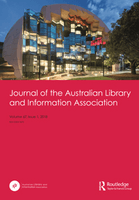
Journal of the Australian Library and Information Association
Scope & Guideline
Empowering research, enriching information stewardship.
Introduction
Aims and Scopes
- Community Engagement and Social Justice:
The journal emphasizes the role of libraries in fostering community engagement and addressing social justice issues, particularly in serving underrepresented populations and vulnerable communities. - Digital Literacy and Technology Integration:
A core focus is on the integration of digital literacy within library services, exploring the implications of emerging technologies such as artificial intelligence, digital archives, and online instruction. - Collection Development and Management:
The journal provides insights into collection management strategies, including the assessment of library collections, the impact of digital resources, and the promotion of diverse and inclusive materials. - Research and Evidence-Based Practice:
There is a strong emphasis on research methodologies and the application of evidence-based practices in library and information science, promoting the importance of data-driven decision-making. - Pedagogy and Learning in Libraries:
The journal explores pedagogical approaches in library settings, focusing on literacy programs, educational support, and the role of librarians as educators. - Cultural Competency and Diversity:
A commitment to cultural competency is evident, with discussions around the representation and inclusion of diverse populations within library services and collections.
Trending and Emerging
- Library as a Community Hub:
There is a growing trend towards positioning libraries as community hubs that support social engagement, collaboration, and partnerships with local organizations, particularly in addressing community needs. - Mental Health and Wellbeing Initiatives:
Publications increasingly focus on libraries' roles in promoting mental health and wellbeing, including programs that support patrons with disabilities, trauma-informed services, and mental health literacy. - Sustainability and Environmental Responsibility:
Emerging themes include the incorporation of sustainability practices in library operations and programming, reflecting a broader societal shift towards environmental responsibility. - Innovative Literacy Programs:
A rise in discussions around innovative literacy programs, particularly those tailored to diverse communities and aimed at enhancing engagement and educational outcomes. - Digital Transformation in Libraries:
There is a marked increase in papers addressing the digital transformation of library services, including the use of artificial intelligence, digital archives, and online learning platforms. - Collaborative Governance in Libraries:
An emerging focus on collaborative governance models within libraries highlights partnerships and cooperative strategies to better serve vulnerable populations and enhance service delivery.
Declining or Waning
- Traditional Cataloguing Practices:
As libraries increasingly adopt digital and automated systems, traditional cataloguing methods are becoming less emphasized, leading to a decline in publications focused solely on these practices. - Print Collection Management:
With the rise of digital resources, the emphasis on print collection management has waned, resulting in fewer papers discussing print-centric strategies and issues. - Historical Library Practices:
Themes centered on historical analysis of library practices are appearing less frequently, as the focus shifts toward contemporary challenges and innovations in library services. - Single-Discipline Focus:
There is a noticeable decline in papers that focus exclusively on single-discipline library issues, with a growing trend towards interdisciplinary approaches that integrate social work, technology, and community services. - Standardized Library Services:
The emphasis on standardized library services is decreasing as libraries are increasingly seeking to tailor their services to meet diverse community needs, resulting in less discussion of one-size-fits-all solutions.
Similar Journals
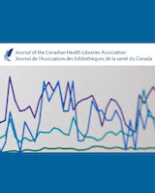
Journal of the Canadian Health Libraries Association
Empowering the future of health information sciences.The Journal of the Canadian Health Libraries Association is a pivotal open-access journal dedicated to advancing the field of health librarianship and information sciences. Published by the Canadian Health Libraries Association, this journal has been fostering the dissemination of innovative research and practices since its inception in 2004. With a focus on critical issues in library and information sciences as well as miscellaneous medicine, it has achieved commendable rankings, noted as Q2 in Library and Information Sciences and Q3 in Medicine (miscellaneous) as of 2023. The journal serves as a vital platform for health librarians, researchers, and practitioners in Canada and beyond, providing valuable insights and fostering collaborations in an ever-evolving information landscape. With its address based in Thunder Bay, Ontario, Canada, and an ISSN of 1708-6892, the journal invites contributions that aim to enhance understanding and improve practices within the health information sector, making it an essential resource for anyone engaged in health libraries and information management.

Bibliotecas-Revista de la Escuela de Bibliotecologia Documentacion e Informacion
Cultivating Insights in Library Practices and Information ManagementBibliotecas-Revista de la Escuela de Bibliotecologia Documentacion e Informacion, published by the Universidad Nacional, Escuela de Bibliotecología, Documentación y Información in Costa Rica, is a vital Open Access journal that has been serving the academic community since 1980. With an E-ISSN of 1659-3286, it focuses on the field of Library and Information Sciences, providing a platform for innovative research, studies, and discussions that contribute to the ongoing development of library practices and information management. Recognized in the 2023 Scopus rankings as part of the Social Sciences category, the journal occupies the Q4 quartile with a ranking of #202 out of 280, reflecting its specialized niche within this rapidly evolving discipline. Over the years, from 2019 to 2024, Bibliotecas has aimed to promote scholarly communication and access to knowledge for researchers, professionals, and students alike, making an important impact in enriching academic discourse and supporting the field’s advancement.

EDUCATION FOR INFORMATION
Exploring New Frontiers in Educational ResearchEDUCATION FOR INFORMATION is an esteemed journal published by IOS PRESS, dedicated to advancing the fields of education, information systems, and library and information sciences. Established in 1983 and continuing through 2024, this scholarly publication provides a platform for innovative research and insightful discussions that cater to the evolving needs of these disciplines. The journal is recognized for its significant contributions to the academic community, holding a Q3 quartile ranking across several categories as of 2023, including Education and Information Systems. Although not an Open Access journal, EDUCATION FOR INFORMATION is indexed in Scopus, boasting a respectable ranking that positions it among the competitive tier of journals in its field. Researchers, practitioners, and students alike will find relevant articles that bridge theoretical foundations with practical applications, addressing contemporary challenges and trends in education and information science. With an international focus and a commitment to enriching the discourse in these vital areas, the journal remains a crucial resource for academia and industry professionals alike.
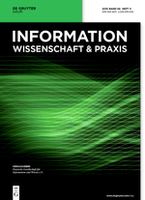
INFORMATION-WISSENSCHAFT UND PRAXIS
Fostering Insightful Discourse on Information Systems.INFORMATION-WISSENSCHAFT UND PRAXIS is a prominent academic journal dedicated to advancing the fields of Information Systems and Library and Information Sciences. Published by Walter de Gruyter GmbH in Germany, this journal serves as a crucial platform for researchers, professionals, and students to publish and access cutting-edge findings and discussions from the intersection of information science and practical applications. With an ISSN of 1434-4653 and E-ISSN of 1619-4292, it has maintained a steady course since its inception in 1997 and will continue to thrive through 2024. While currently categorized in the Q4 quartile of pertinent fields, it provides value by soliciting diverse perspectives and innovative research, albeit ranking within the lower percentiles in prominent databases such as Scopus. The journal's commitment to fostering discourse in the critical issues of information management and its impact on society is essential in this rapidly evolving digital era. Though not an open-access journal, the insights gleaned from its pages are vital for those invested in the future of information science. For interested contributors and readers, INFORMATION-WISSENSCHAFT UND PRAXIS stands as a beacon for ongoing research and practical enlightenment in its domain.

BiD-Textos Universitaris de Biblioteconomia i Documentacio
Illuminating Trends in Library and Information ResearchBiD-Textos Universitaris de Biblioteconomia i Documentacio, published by the Universitat de Barcelona, Servei Publicacions, is a pivotal open-access journal that has been contributing to the fields of Library and Information Sciences since its inception in 1998. With its commitment to disseminating scholarly work broadly, BiD serves as a crucial platform for researchers, professionals, and students seeking to explore the latest trends and developments in biblioteconomia and documentation. Positioned in Q4 category in the Library and Information Sciences as per the 2023 metrics, the journal actively embraces its role in highlighting diverse perspectives and innovations within the discipline. The journal offers an accessible forum for rigorous research, reflective practice, and discourse, particularly relevant as it converges into contemporary challenges and opportunities up to 2024. By remaining open access, it promotes equitable access to knowledge, thus ensuring that vital research reaches a wider audience within the academic community and beyond.
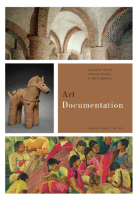
Art Documentation
Chronicling Artistic Endeavors with Scholarly PrecisionArt Documentation is a distinguished journal published by the University of Chicago Press, dedicated to advancing the field of art documentation and its related disciplines. With a focus on interdisciplinary studies encompassing Visual Arts, Performing Arts, Archaeology, and Library and Information Sciences, this journal offers a pivotal platform for researchers and professionals aiming to enhance their understanding and practice in these areas. Despite not providing open access options, its contributions are invaluable, showcasing innovative research and discussions that reflect contemporary challenges and methodologies in the art documentation sphere. As evidenced by its Scopus ranking, placing it within the 68th percentile for Visual Arts and Performing Arts and the 49th for Archaeology, the journal demonstrates a commitment to high-quality scholarship. Published annually and spanning converged years from 2015 to 2023, Art Documentation remains vital for academics and practitioners seeking to engage with the latest trends, methodologies, and scholarly discourses enriching the art documentation field.

Investigacion Bibliotecologica
Exploring New Frontiers in Bibliographic InquiryInvestigacion Bibliotecologica, published by the National Autonomous University of Mexico, stands as a vital resource in the field of library and information sciences. With a legacy of open access publishing since 1986, this journal endeavors to disseminate high-quality research which aims to advance knowledge and practices within the library and information sector. With an ISSN of 0187-358X and E-ISSN 2448-8321, it has secured its position in the competitive landscape of scholarly communication, earning a commendable Q3 ranking in its category as of 2023. The journal's influence is reflected in its Scopus ranking within the library and information sciences field, where it ranks #151 among 280 journals. Located in Mexico City, it provides scholars, professionals, and students with open access to its content, facilitating knowledge sharing and academic collaboration. As it continues its publication journey from 2008 to 2024, Investigacion Bibliotecologica remains an essential platform for innovative inquiries, practical insights, and the latest developments in library science.
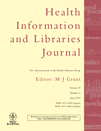
Health Information and Libraries Journal
Fostering collaboration in the evolving landscape of health information.Health Information and Libraries Journal, published by WILEY, is a leading academic journal dedicated to advancing the field of health informatics and library sciences. Boasting an impactful presence, it holds a remarkable Q2 ranking in both Health Informatics and Health Information Management, and a prestigious Q1 ranking in Library and Information Sciences as of 2023. With its ISSN 1471-1834 and E-ISSN 1471-1842, the journal critically examines the intersection of information management and healthcare practices through rigorous peer-reviewed research, case studies, and insightful editorials. The journal’s focus spans topics of significant relevance, including emerging technologies, data management, and the critical role of libraries in healthcare, making it a vital resource for researchers, professionals, and students alike. With a commendable standing in Scopus rankings—positioned at #32/280 in Library and Information Sciences and #35/138 in Health Informatics—the journal continues to contribute to a deeper understanding of health information systems and their applications in contemporary settings. Given its diverse and global readership, the Health Information and Libraries Journal remains an essential platform for disseminating innovative ideas and fostering collaborative discussions in the ever-evolving landscape of health information management.

LAW LIBRARY JOURNAL
Connecting law and library science for enhanced scholarship.Law Library Journal, published by the American Association of Law Libraries, serves as a pivotal resource for academics, practitioners, and students in the fields of law and library science. With an ISSN of 0023-9283 and an e-ISSN of 0023-9283, this esteemed journal examines the dynamic interplay between legal scholarship and library practices, ultimately contributing to the enhancement of legal research methodologies. The journal, which has been in circulation since 1978, spans comprehensive topics relevant to law libraries, legal information management, and the evolving role of digital resources in legal research. Although currently not an Open Access publication, its scholarly contributions are critical, as evidenced by its placement in the Q3 quartile in both the Law and Library & Information Sciences categories for 2023. Notably, its rankings in Scopus—765th out of 1025 in Law and 224th out of 280 in Library and Information Sciences—demonstrate its commitment to maintaining rigorous academic standards while addressing the practical needs of legal information professionals. Whether you are conducting research or looking to stay informed about the latest trends in law librarianship, the Law Library Journal remains an essential reference for the evolving landscape of legal practice and information science.

African Journal of Library Archives and Information Science
Cultivating a Culture of Knowledge Sharing.The African Journal of Library Archives and Information Science (ISSN: 0795-4778; E-ISSN: 0795-4778) is a pivotal publication in the field of Library and Information Sciences, published by ARCHLIB & INFORMATION SERVICES LTD in Nigeria. With a focus on the diverse and evolving challenges faced by libraries and information professionals in the African context, this journal serves as a platform for scholarly communication, fostering innovation and collaboration among researchers, practitioners, and academics. The journal has a notable impact factor, reflected in its Q3 ranking within the category for 2023, and is indexed in Scopus, holding a percentile rank of 22nd in its field, further validating its relevance and scholarly contribution. Running since 2008 with continual publications through to 2024, the journal aims to advance knowledge, share best practices, and highlight emerging trends in librarianship and information science across Africa and beyond. By offering open access options, it ensures wide dissemination of knowledge, making it an essential resource for those dedicated to enhancing information services and archives.